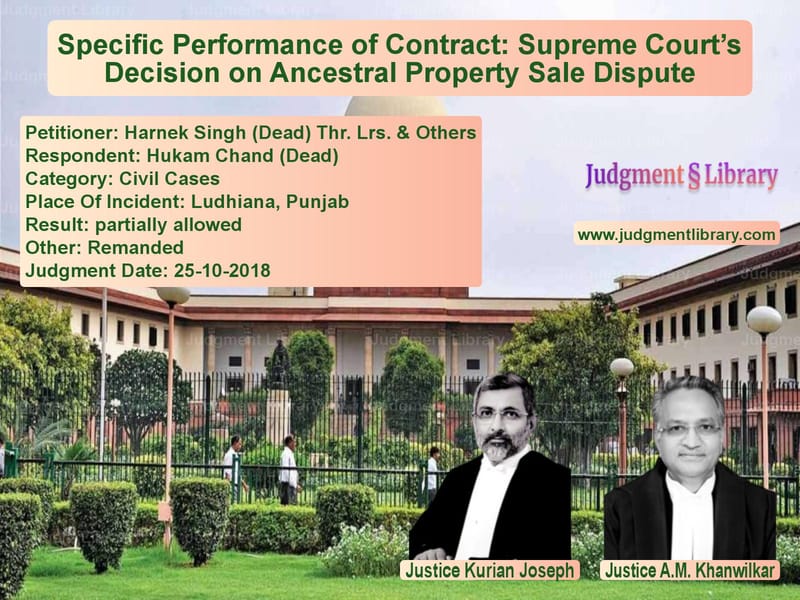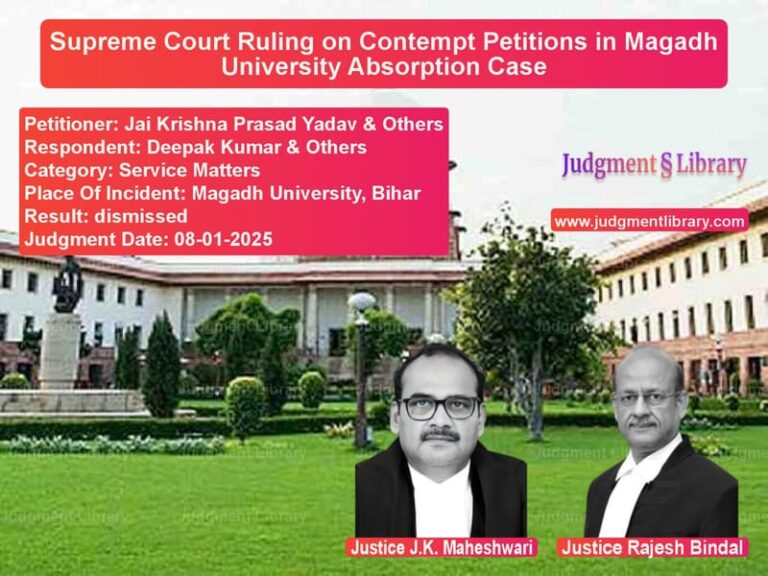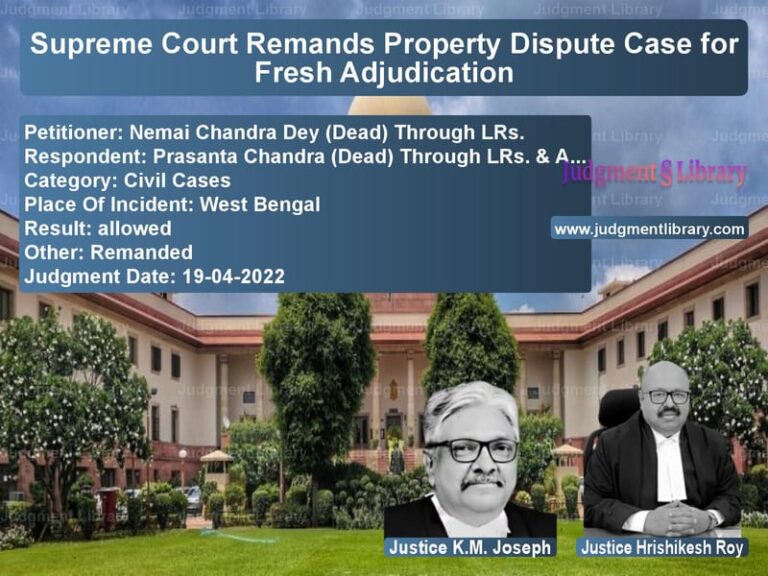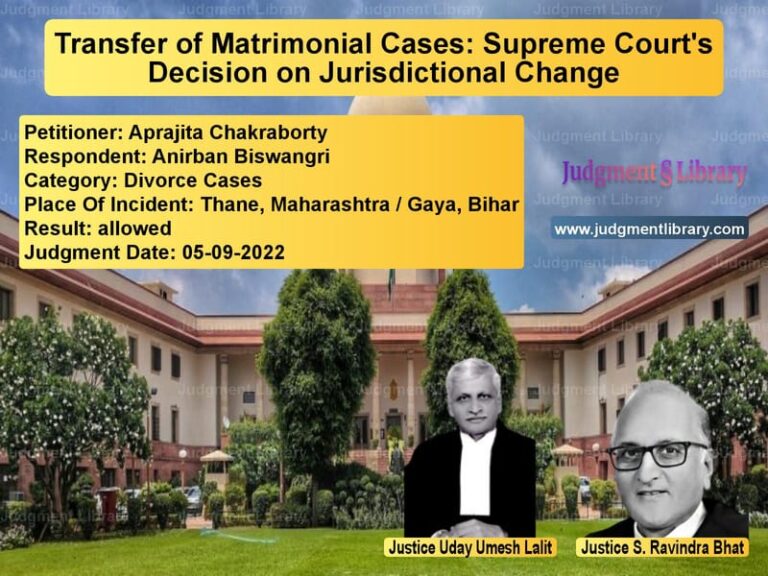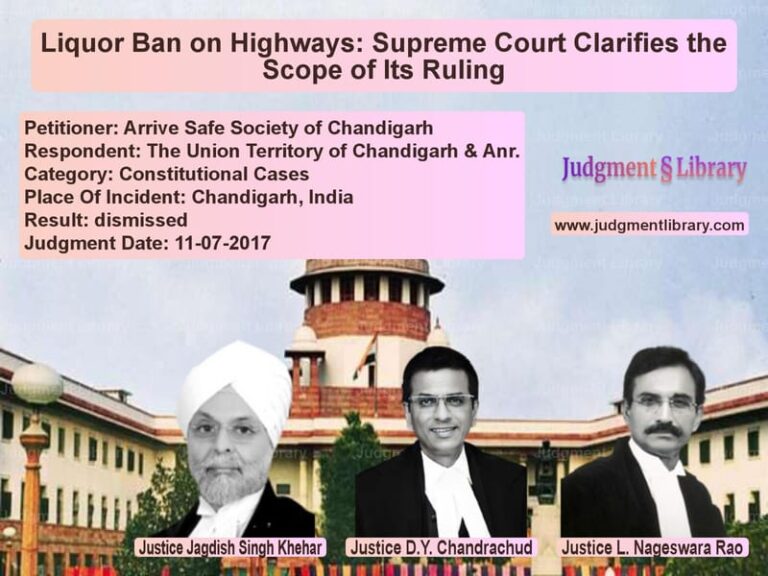Specific Performance of Contract: Supreme Court’s Decision on Ancestral Property Sale Dispute
The case of Harnek Singh (Dead) Thr. Lrs. & Others vs. Hukam Chand (Dead) is a significant judgment that addresses the enforcement of a specific performance contract concerning ancestral property. The Supreme Court of India, in its ruling on October 25, 2018, deliberated on the legality of a sale transaction executed by the Karta of a Joint Hindu Family and the subsequent legal challenges raised by coparceners.
The judgment is crucial in understanding the limitations of a Karta’s power in disposing of ancestral property and the legal rights of coparceners who contest such transactions. The Court directed that an ongoing civil suit regarding the cancellation of sale deeds should be adjudicated before deciding on the enforcement of the contract.
Background of the Case
The dispute arose when the plaintiffs sought specific performance of a sale agreement for 7 kanals of land. The defendant, Hari Singh, had executed three sale deeds for parts of his property. However, when he refused to execute the sale deed for the remaining land, the plaintiffs filed a suit for specific performance.
The trial court ruled in favor of the plaintiffs, granting specific performance. The first appellate court reversed this decision. However, in the second appeal, the High Court reinstated the trial court’s order, leading the appellants to approach the Supreme Court.
Arguments by the Appellants (Legal Representatives of Hari Singh)
- The sale was disputed by other coparceners who had filed a separate suit (CS No. 372 of 1983) seeking cancellation of the sale deeds.
- The coparceners argued that Hari Singh was not in a fit state of mind to execute the sale due to his addiction to alcohol and drugs.
- They contended that as the property was ancestral, the sale was not for the benefit of the Joint Hindu Family.
- The pending suit for cancellation of the sale deeds should be adjudicated first as it impacts the validity of the contract.
Arguments by the Respondent (Hukam Chand’s Legal Representatives)
- The sale agreement was valid and executed by Hari Singh in a fit state of mind.
- There was already a concurrent finding by lower courts that Hari Singh was competent at the time of executing the sale deeds.
- The plaintiffs were bona fide purchasers who had fulfilled their part of the contract.
Supreme Court’s Analysis and Judgment
The Supreme Court examined the legal validity of the sale, the rights of the coparceners, and the implications of the pending civil suit challenging the transaction.
Key Observations of the Court
- The Court recognized that the pending civil suit (CS No. 372 of 1983) could impact the validity of the sale.
- The Court noted that there was already a concurrent finding that Hari Singh was in a fit state of mind at the time of executing the sale deeds.
- However, the core issues regarding the ancestral nature of the property and whether the sale was for the benefit of the family needed to be determined separately.
Directions Issued by the Supreme Court
- The trial court in Ludhiana was directed to expeditiously decide the pending suit (CS No. 372 of 1983).
- The trial court was instructed not to reconsider the issue of Hari Singh’s mental capacity, as it was already settled.
- The suit should focus only on:
- Whether the property was ancestral.
- Whether the legal representatives were coparceners.
- Whether the sale was for the welfare of the Joint Hindu Family.
- Whether Hari Singh had the authority as Karta to dispose of the property.
- The Supreme Court noted that the outcome of RSA No. 447 of 1987 (relating to specific performance) would depend on the decision in CS No. 372 of 1983.
Impact of the Judgment
This ruling is significant in the context of Joint Hindu Family property transactions:
- It reaffirms that the sale of ancestral property by a Karta must be for the benefit of the family.
- It ensures that the rights of coparceners challenging such sales are adequately considered.
- It establishes that pending suits affecting property ownership must be resolved before enforcing specific performance contracts.
Conclusion
The Supreme Court’s decision in Harnek Singh vs. Hukam Chand underscores the need to carefully examine the rights of coparceners before enforcing specific performance of a contract involving ancestral property. By directing that the pending civil suit be adjudicated first, the Court has ensured that justice is served while protecting the interests of all stakeholders involved.
Petitioner Name: Harnek Singh (Dead) Thr. Lrs. & Others.Respondent Name: Hukam Chand (Dead).Judgment By: Justice Kurian Joseph, Justice A.M. Khanwilkar.Place Of Incident: Ludhiana, Punjab.Judgment Date: 25-10-2018.
Don’t miss out on the full details! Download the complete judgment in PDF format below and gain valuable insights instantly!
Download Judgment: Harnek Singh (Dead) vs Hukam Chand (Dead) Supreme Court of India Judgment Dated 25-10-2018.pdf
Direct Downlaod Judgment: Direct downlaod this Judgment
See all petitions in Property Disputes
See all petitions in Specific Performance
See all petitions in Judgment by Kurian Joseph
See all petitions in Judgment by A M Khanwilkar
See all petitions in partially allowed
See all petitions in Remanded
See all petitions in supreme court of India judgments October 2018
See all petitions in 2018 judgments
See all posts in Civil Cases Category
See all allowed petitions in Civil Cases Category
See all Dismissed petitions in Civil Cases Category
See all partially allowed petitions in Civil Cases Category

